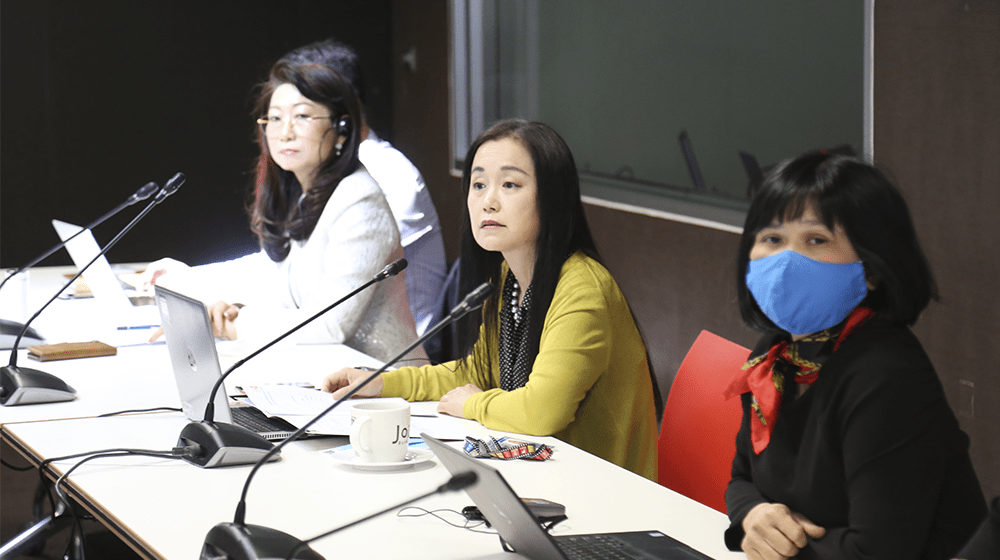Ms. Tran Tuyet Anh, Director of the Family Department, Ministry of Culture, Sports and Tourism;
UN colleagues and members of the drafting committee;
Today, it is my pleasure to join Ms Tran Tuyet Anh to chair this consultative meeting to discuss the draft revised Law on Domestic Violence Prevention and Control. This is a special opportunity for the UN system to collectively share our perspectives in addressing the issue of domestic violence – violence against women and children - and to ensure that our voices are heard among the relevant Government authorities in the finalisation process of the new Domestic Violence Prevention and Control (DVPC) Law.
I also want to highlight that our participation in this meeting demonstrates our full commitment and active response to Vietnam’s National Action Month for gender equality and prevention and response to gender-based-violence as well as to the UN’s 16 days of activism against gender-based violence. Let us join our efforts to ensure that “All women and children in Vietnam, including those most vulnerable, live a life free of violence”
Dear UN colleagues,
May I take this opportunity to recall the fact that Vietnam’s endorsement of the Domestic Violence Prevention and Control Law in 2007 showed the country’s strong commitment and outstanding efforts in addressing domestic violence, especially domestic violence against women and girls. The Law has created a sound legal corridor for the development as well as the implementation of many policies and intervention programs in the last two decades.
In 2016, with technical support from UNFPA, the Ministry of Culture, Sports and Tourism reviewed the 10-year implementation of the Domestic Violence Prevention and Control Law, focusing on three areas: (i) the law enforcement and involvement by relevant stakeholders; (ii) the consistency of the law with international treaties; and (iii) the consistency of the law with other related laws and policies in Vietnam. The review recommended the revision of the 2007 Law on Domestic Violence Prevention and Control for 4 main reasons. First, it should be more based on human rights and in accordance with the principle of the survivors–centred approach. Second, it is necessary to take into consideration other forms of violence against women and girls outside of the family setting, so that domestic violence is not addressed just as a family and private matter. Third, adequate and quality essential services, including not only sheltering, but also health, counselling, police protection and justice services, should be provided. And lastly, Interventions to prevent domestic violence should focus on behavioural change and grassroots response, and communication activities should not end just with awareness-raising and campaigns.
The findings of the UNFPA-supported 2019 National Study on Violence against Women in Vietnam showed little change in terms of prevalence of violence, compared to the 1st study conducted in 2010. This is very disappointing. According to the 2019 Study, 62.9 percent of women in Vietnam experienced one or more forms of physical, sexual, emotional and economic violence, and controlling behaviours by their husband in their life time. Violence is hidden in Vietnam’s society, as 90.4 percent of gender-based violence survivors did not seek any help from authorities and half of them never told anyone about the violence. Furthermore, violence against women is costing the country 1.81% of GDP. And this is an alarming issue. The recommendations arising from the 2019 National Study on VAW also highlighted the need to review, amend and revise the existing national policies and relevant laws, including the Domestic Violence Prevention and Control Law, to make them in line with international commitments and standards.
As a result, UNFPA has been supporting the Ministry of Culture, Sports and Tourism to review the Law, taking into account all the recommendations raised from various studies. The revision also aims at ensuring that international standards and commitments on the prevention and response to violence against women and girls will been reflected in Vietnam’s relevant laws and policies. UNFPA also assisted the Ministry in developing a dossier of the proposals for the amendment of the Law as an official submission to the National Assembly. It includes 3 review reports, namely the Review on Gender Assessment, Review on International Experience on Domestic Violence Prevention and Control Laws and lessons learned for Viet Nam, and Review on Vietnam’s existing laws and policies relating to the Domestic Violence Prevention and Control Law.
With this background, your comments and input to the revised Law today are of high value to help the drafting committee to finalise it before submitting it to the National Assembly for review and adoption next year. We must not leave anyone behind in Vietnam’s sustainable development process, and that includes survivors of violence, and women and children at risk of violence.
Thank you very much for your attention and participation today!



